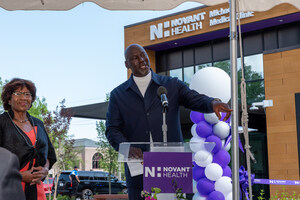WINSTON-SALEM, N.C., Nov. 13, 2012 /PRNewswire/ -- Novant Health, a leader in efforts to identify and inform hospital patients who are at risk of developing diabetes, is urging adults across the country to assess their risk and talk to their doctors during November, Diabetes Awareness Month, to see if additional testing or lifestyle changes are needed.
(Logo: http://photos.prnewswire.com/prnh/20121113/CL11962LOGO )
Since implementing its own "search and rescue" screening of admitted patients in September 2010, Novant has identified more than 4,200 hospital patients previously undiagnosed with type 2 diabetes, including some with blood sugar levels so high they required immediate medical attention.
According to the American Diabetes Association, nearly 26 million Americans have diabetes and another 79 million more have prediabetes, which generally develops into diabetes within two to 10 years, but is easily detected through tests.
"Recognizing that diabetes has become an alarming health epidemic in our country, Novant Health looked at the patients in our own hospitals and were startled by the results," said Dr. Jim Lederer, vice president of clinical improvement for Novant Health. "Diabetes is a serious disease, but it can be successfully managed if detected early. One in three American adults is at risk for developing type 2 diabetes, yet many don't realize it because the debilitating, potentially deadly, disease often shows few early symptoms."
Dr. Lederer suggests people take the American Diabetes Association's Diabetes Risk Test on Wednesday, Nov. 14, which is World Diabetes Day. People can go to http://www.diabetes.org/diabetes-basics/prevention/diabetes-risk-test/ to determine their risk and whether they should talk to their doctor about additional testing.
Diabetes often goes undiagnosed because many of its symptoms seem relatively harmless, such as cuts or sores that are slow to heal, blurred vision or recurring skin, gum or bladder infections. Often people with type 2 diabetes have no symptoms. Lifestyle changes such as weight loss, increased physical activity and following a healthy diet can substantially reduce the risk of developing type 2 diabetes and significantly improve patients' quality of life.
If not diagnosed and treated, diabetes can cause blindness, kidney disease, amputations and many other complications. Diabetes causes more deaths a year than breast cancer and AIDS combined, according to the American Diabetes Association. Two out of three people with diabetes die from heart disease or stroke.
"Too often prediabetes is dismissed as 'a touch of the sugar' or too borderline to take seriously," said Dr. Lederer. "But early diagnosis is critical to reduce chances of developing devastating complications later."
Originally conceived as a pilot program at Novant Health, the diabetes test is now a standard part of patient screening at Novant hospitals, and Dr. Lederer hopes more hospitals in the nation adopt this type of bold detection program.
Under Novant Health's initiative, patients admitted to the hospitals for any reason (except in maternity, where gestational diabetes risk already is closely monitored) receive a hemoglobin A1C test. Patients whose measures are 6.5 or greater are alerted they may have the disease, and their primary care physician receives a letter reporting the test results.
"Aggressive follow-up is crucial to get control of the disease early so we can prevent future diabetes complications," said Cathy Reeder-McIntosh, a Certified Diabetes Educator and Assistant Manager for Diabetes Services at Forsyth Medical Center in Winston-Salem, N.C., Novant's largest hospital. "With early diagnosis, we can ensure people receive the proper care and education. Prevention is a key focus."
Novant Health diabetes educators visit patients in the hospital and provide education about managing the disease. Patients are taught how to monitor their own blood sugar, counseled on medication and needed lifestyle changes, and encouraged to follow up with education classes and support groups.
"We shock some patients with the news that they have diabetes. Managing it is a 24-hour a day job," says Reeder-McIntosh, who has type 1 diabetes. "The good news is that when people are equipped with the tools and understanding of how to manage it, they can live long and healthy lives. They learn to take charge of their diabetes."
About Novant Health
Novant Health is a not-for-profit integrated group of 13 hospitals and a medical group consisting of 1,104 physicians in 342 clinic locations, caring for patients and communities in North Carolina, Virginia, South Carolina and Georgia. Hospitals include the following: Presbyterian Hospital, Presbyterian Orthopaedic Hospital, Presbyterian Hospital Matthews and Presbyterian Hospital Huntersville in the Charlotte, N.C ., area; Forsyth Medical Center and Medical Park Hospital in Winston-Salem, N.C.; Kernersville Medical Center, Kernersville, N.C.; Thomasville Medical Center, Thomasville, N.C.; Brunswick Novant Medical Center, Bolivia, N.C.; Rowan Regional Medical Center, Salisbury, N.C.; Franklin Regional Medical Center, Louisburg, N.C.; Upstate Carolina Medical Center, Gaffney, S.C.; and Prince William Hospital, Manassas, Va. Other Novant facilities and programs include outpatient surgery centers, medical plazas, rehabilitation programs, diagnostic imaging centers and community health outreach programs. Novant Health is ranked 21st nationally among the 2012 Top 100 Integrated Healthcare Networks, according to an analysis by the IMS health informatics company.
SOURCE Novant Health
WANT YOUR COMPANY'S NEWS FEATURED ON PRNEWSWIRE.COM?
Newsrooms &
Influencers
Digital Media
Outlets
Journalists
Opted In





Share this article